Sometimes it amazes me how much we rely on technology. The amount of travelers I meet who can't escape the clutches of their smartphones or laptops in the common rooms of hostels; the amount of people who don't get lost in new cities anymore because they've already downloaded the right map.
In 2007, I went InterRailing around Europe. I was 18 and on my gap year, eager to meet new people who shared the same passion for traveling that I did. I slept exclusively in the bunkbed-filled dorm rooms of hostels, hung out in communal kitchens and eventually discovered how easy it was to chat to other guests – while chopping garlic, or on comfy sofas.
Every couple of weeks, I'd sit down at the hostel's one computer, a bulky affair with a chunky, slightly greying keyboard, and do one particular thing: email my parents.
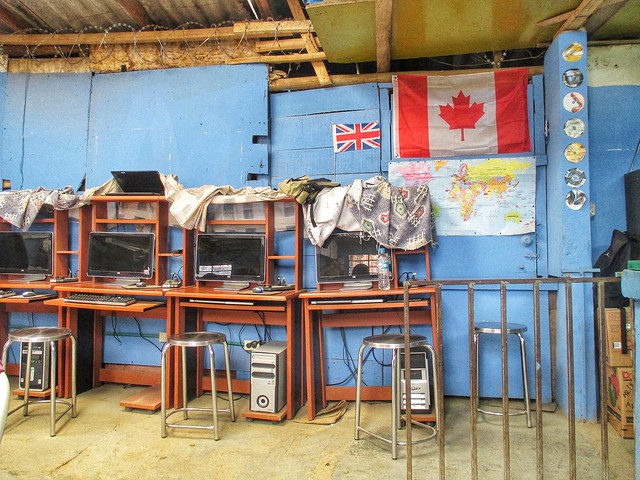 |
| Public computers at Angeles de Medellin |
Technology-obsessed traveling
Fast forward seven years, and my valuables have increased somewhat. For the last year in South America, I've been carrying an iPad, a Kindle, an iPod, a digital camera, and a cheap phone that's welcomed a number of foreign SIM cards.The crazy thing is that this collection is me being minimal. I've never had a smart phone; I don't use an SLR camera when I travel; and I chose not to bring a laptop because I was worried it might break or get stolen and I wanted to minimize that damage. But after seventeen months attempting to run a website solely on an iPad (NB: it can be done, but it's an absolute nightmare), I'm ridiculously excited to get my hands on a laptop. And an iPhone. And a better Kindle.
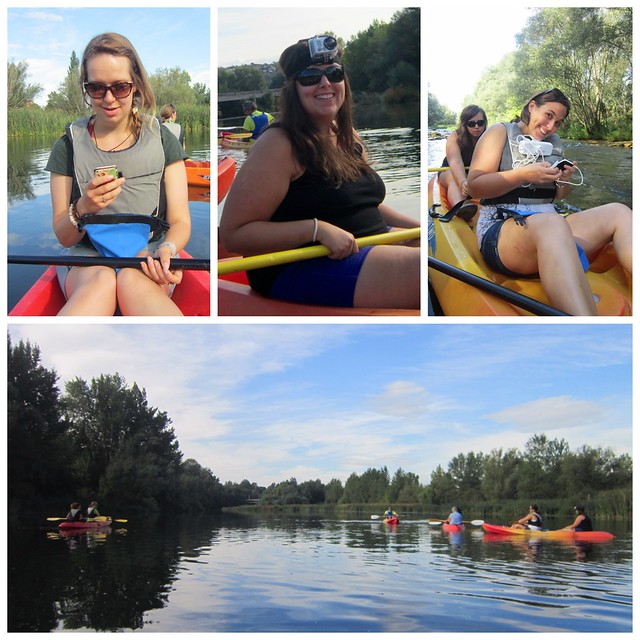 |
| Bloggers are tech-obsessed - even in the middle of a river! |
But there's no escaping the fact that I'm addicted to social media, and to the internet in general. Whatever way I try to sugarcoat it by saying these various social media accounts are more for work than pleasure, the fact remains that checking them is the first thing I do before I go to sleep, and the first thing I do when I wake up.
The downsides of so much technology
Technology and the internet has irrevocably changed the way we travel. A direct result of keeping in touch with our extensive online networks means simultaneously losing touch with where we are; with our current surroundings, with local people, and with fellow travelers.And now, more than ever, striking up a conversation with those travelers means you run the risk of 'interrupting' their internet time: Skyping with a friend back home, researching their next destination – or writing their travel blog.
Such a reliance on technology allows us to retreat from the real world – something which can be soothing on occasion, but not advisable in the long term. It's like a comfort blanket that says you don't have to fully engage if you don't want to: if things are getting too much, just scroll through your newsfeed and blank everything else out.
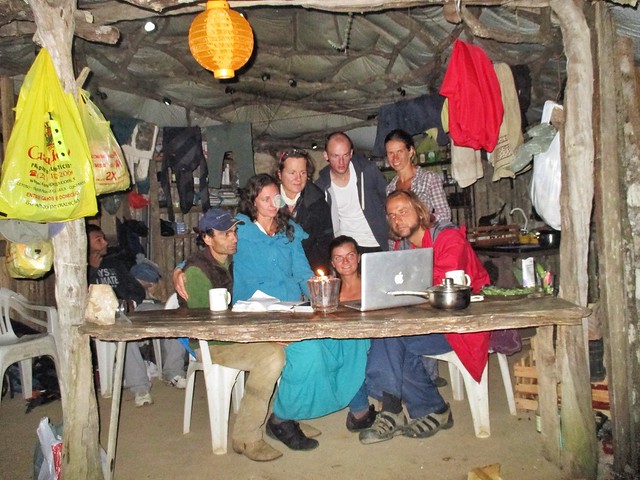 |
| Using computers in the middle of the Brazilian jungle. |
Using the internet has its major benefits, of course. For a start I wouldn't have an ability to share my experiences in the way I do, nor would I have the audience to read it. Then there's sites like CouchSurfing, HelpXchange, WOOFing – all of which foster networks of like-minded people – and I've been able to stay in touch with dozens of people I've met in countries all over the world, thanks to Facebook.
But it often gets to be too much. With the amount of traveler-orientated sites eagerly throwing suggestions our way, many travelers rely on reviews to tell us whether or not to sleep in that hostel, eat in that cafe, go to that site. We can book beds and tables and transport options; even discover detailed directions on how to reach that 'secret beach' which nobody knows about – except every person reading the same TripAdvisor post.
Though it feels wonderful to be so connected all the time, using this much technology when you're traveling seems fundamentally against the concept of travel in general. Whereas friends and family used to know nothing about your travels except for the occasional “I'm alive!” postcard/phonecall/email, now people are inundated with real-time updates of what's happening in your trip: the food, the sights, the “Hey, I finally made it to Machu Picchu/the Taj Mahal/the Great Barrier Reef – in fact I'm there right now!” statuses.
 |
| This photo didn't make it online until months after I visited the Taj Mahal. Did I care? |
We seem to have reached a point where the act of traveling itself is only verified when it can be recorded or broadcast to other people; when an incredible travel experience feels bittersweet if you don't happen to have your camera.
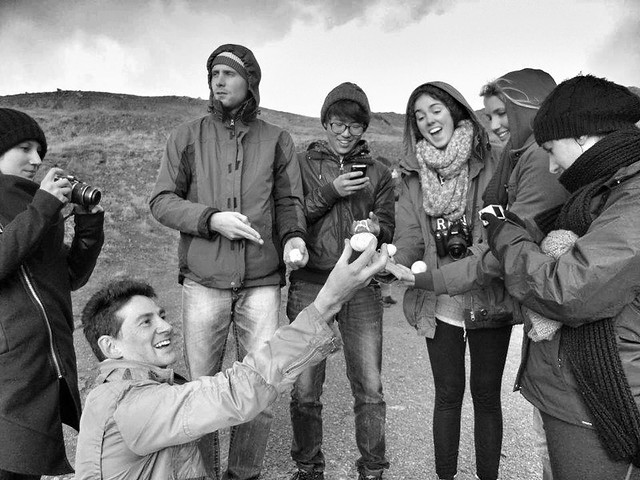 |
| Taking photos of an egg in Iceland. In the photo's defense, we'd just boiled an egg in an Icelandic hot spring - but still. |
More technology = more risk
Technology itself seems particularly important to a lot of travelers now. Everyone's carrying the latest GoPro camera or an expensive SLR; most people have some sort of smart phone; and there are more iPods and Mac laptops charging in hostels than there are people.We've all been made to think that we need this stuff to be abroad – that without it, our travels aren't going to be complete. Checking your email on the hostel computer doesn't cut it anymore; in fact, a hostel that doesn't offer wifi is often condemned by reviews on HostelWorld and TripAdvisor to a point that people won't even stay there.
But carrying so much technology makes me supremely uncomfortable. Maybe I overthink these things more than most, but I'm overtly aware of being a walking target when I heave my various backpacks on and leave a bus station in a strange new city. I am consistently worried about being mugged, and I take as many precautions as I can to try and minimise any possible damage.
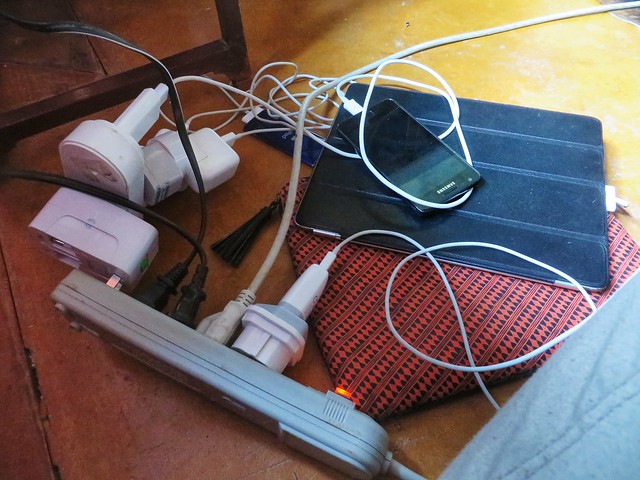 |
| Excessive charging: a standard sight in most hostels nowadays. |
And when all these things go missing, there are two main outcomes. You can make the effort to claim on insurance and replace everything, but that usually happens once you've gone back home. While you're still traveling, it means you have to deal with a 12 hour bus ride without musical distraction, to rely on internet cafes to book hostels in advance, to ask strangers to take photos of you and maybe email them at a later date.
Even without the possibility of theft, there's a myriad of technology-related problems. Since being in South America I've had two cameras break and am significantly worried about my current third, which keeps sporadically deciding it simply doesn't want to turn on. When I briefly flew back to London I picked up a portable charger – and then promptly managed to forget to pack the charging cable for it. So I'm now carrying a useless piece of equipment in my bag.
Help! I'm addicted to technology!
For the last three months I've been living in Medellin and working at a newspaper. From day 1 it was assumed that I'd be traveling with a computer that I could use at work; every day I've carted my iPad and its charger on the commute to the office, along with the myriad of other people who I worked alongside.In a way, this job in Colombia has been the pinnacle of my internet and technology usage. When my friends and readers think I'm “traveling in Colombia”, I'm barely ever offline. And when I finally shut the iPad and try to sleep, my brain flickers with the virtual images I've gorged on all day.
It's simply not the way to travel.
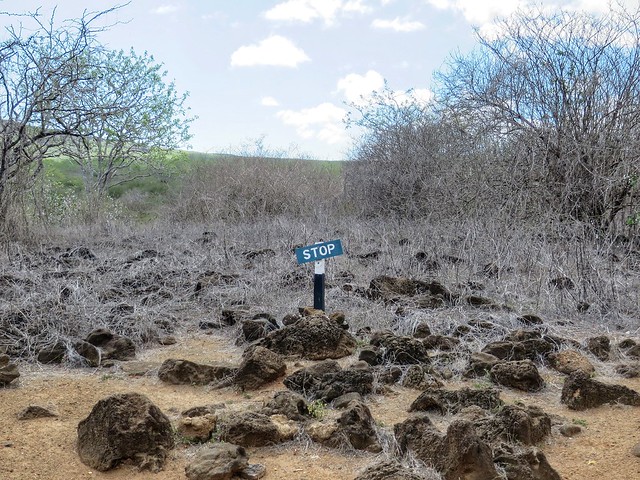 |
| Stop signs even appear in the Galapagos, would you believe? |
Cutting out my technology focus in Cuba
To test myself properly though, I need an outside force that prevents me from using technology. Something a month in Cuba could very well achieve.As a country with almost zero internet access, I'll be forced to go cold turkey from my electronics and actually talk to people face-to-face (shock horror!) instead. And write. So much writing.
While I'm offline for the next month, I thought I'd invite you guys to try out an internet-free life too. Because when you think about it, how often do you spend offline? It shocked me to realize that I could actively remember the times I've been completely disconnected for more than a few days – a week on the Colombian coast, two weeks without internet in Brazil…
So how about a day away from the internet a week? Or switching off your wifi for the entire weekend? Even just for an evening out with your friends? Because it's really worth going off-grid for a little while. If only to prove to yourself that you can shrug off your technology addictions.
--
Read more from Flora the Explorer at http://floratheexplorer.com/
